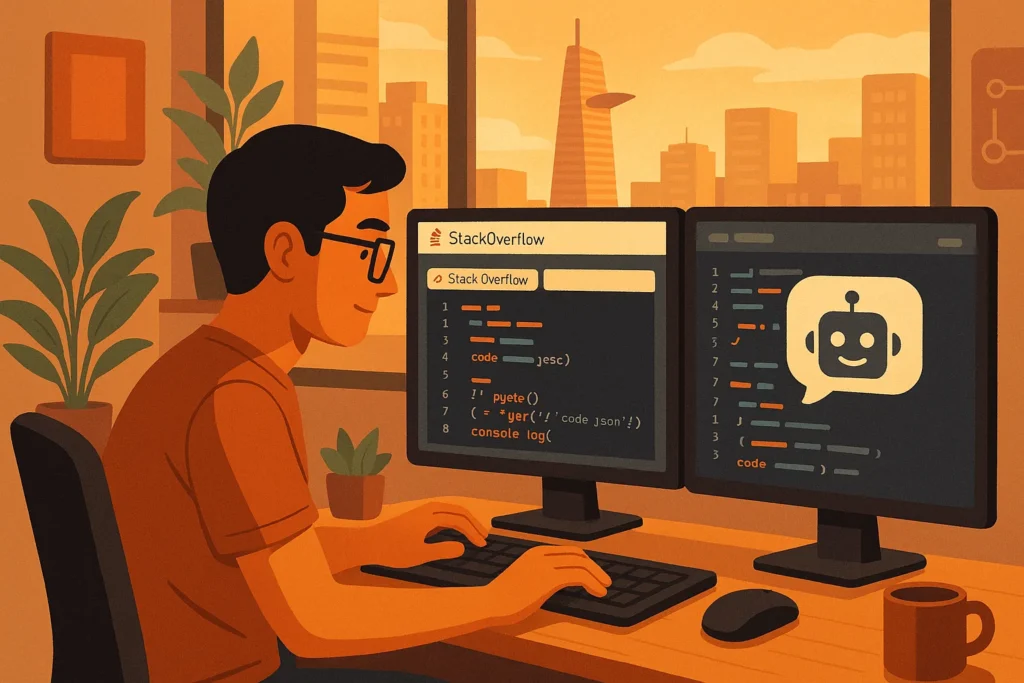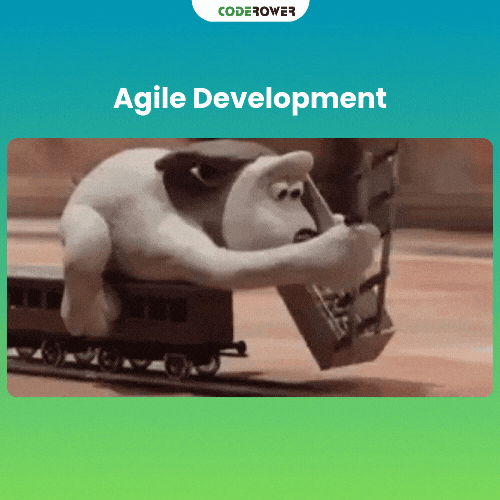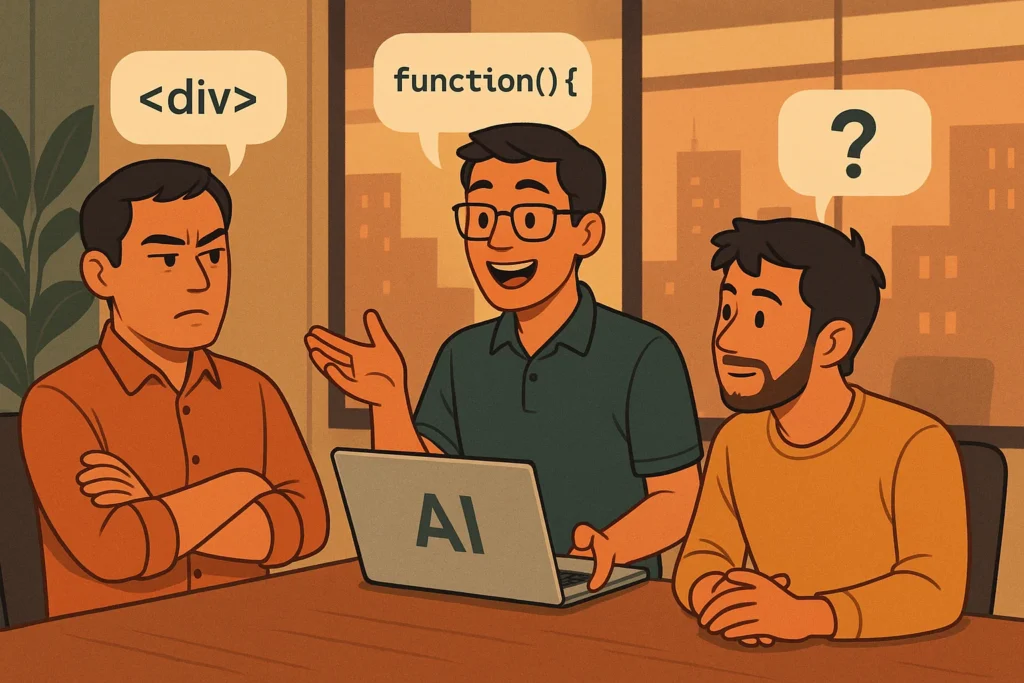So… I Got Mocked at a Company Tech Talk (And Maybe I Deserved It?)
Okay, so picture this: Company tech talk. Smart people everywhere. The speaker’s talking about modern development practices and how to maintain the position as a Tech Lead in Ai hype era, and I’m sitting there nodding along like, “Yeah, yeah, this makes sense.” Then they open it up for discussion.
And me? I raised my hand in Google Meet.
“I think AI coding is revolutionary,” I said, probably with far too much excitement. “Context engineering is a complete game changer for how we build software, the specs, design and task docs are crazy and the border between Tech Lead and BA are less and less.”
The speaker nodded. Smiled. Agreed at first.
Then the next tech talk happened.
Later, He literally used examples that felt like indirect shots at what I said. Not naming names, but the energy was definitely “some people think AI is magic, but real developers know better” vibes.
I didn’t clarify. Didn’t defend myself. Just sat there thinking, huh, that’s interesting.
Here’s the thing though—and this is what I’ve been thinking about for months now—maybe we were both right? Or both wrong? Or maybe the whole “vibe coder vs real developer” debate is just… pointless?
Let me explain.
🎯 What The F- Even Is “Vibe Coding” Anyway?
So there’s this term floating around the internet: vibe coding.
Some people use it like sarcasm. “Oh, you’re just vibing with Claude/Copilot/Cursor instead of actually coding.” Like it’s somehow less legitimate than copying Stack Overflow answers line by line (which, let’s be real, we ALL did before AI tools existed).

But here’s my take after working as a Product Manager and BA for a few years and playing around with code for even longer: vibe coding is just… coding? But with better tools?
Think about it:
What we did in 2015:
- Google the error message return from the Console
- Find a Stack Overflow answer from 2012
- Copy-paste the code, tweak a few things
- Hope it works
- Debug when it doesn’t
- Repeat until something ships
What we do in 2025:
- Ask Claude/Copilot what’s wrong
- Get contextualized answer for YOUR specific code
- Paste the suggestion
- Hope it works
- Debug when it doesn’t
- Repeat until something ships
The process is literally the same. The only difference? The AI understands the context better than a random Stack Overflow post from when people were still using Python 2.7.
Context Engineering: The Skill Nobody Talks About (But Everyone Uses)
Okay so here’s where I might’ve gotten too excited at that tech talk.
When I said “context engineering is a game changer,” what I meant was this: the skill of giving AI tools enough context to generate useful code is becoming just as important as writing the code yourself.
Think about it like this, when you ask a senior developer for help, you don’t just say “my code broke.” You say:
- “I’m working on a React component”
- “Using TypeScript with strict mode”
- “Getting this specific error”
- “Already tried XYZ”
- “Here’s the relevant code snippet”
- And here is the screenshots
That’s context. That’s what makes the difference between a helpful answer and “idk man, works on my machine 🤷”

AI tools are the same. Give Claude or Copilot:
- Your tech stack
- The specific problem
- What you’ve already tried
- Your project structure
- The error messages
And suddenly you’re not just “vibing”, you’re engineering a solution with an incredibly knowledgeable pair programming partner who doesn’t judge you for not knowing every API by heart.
PlantUML Diagram – Context Engineering Workflow:

But yeah, maybe I was too enthusiastic. Maybe the speaker thought I was saying “AI can replace real developers” when what I meant was “AI can help developers work smarter and PO can dip a toe in.”
Or maybe—and this is what I really think—we’re all just feeling defensive about our skills in an era where the tools are changing so fast that nobody really knows what “real development” even means anymore.
Let’s Talk Numbers: Is AI Actually Revolutionary?
Okay so I did some digging (because apparently I can’t let this go):
GitHub’s research on Copilot:
- Developers complete tasks 55% faster
- Report significantly higher job satisfaction
- Feel more in “flow state” while coding
McKinsey’s analysis:
- AI could increase software engineering productivity by 20-45%
- Biggest impact: code generation, testing, documentation
Stack Overflow 2024 Survey:
- 76% of developers are using or planning to use AI tools
- That’s not a niche. That’s the mainstream.
So when people mock “vibe coding” or AI-assisted development… they’re mocking what three-quarters of the industry is already doing or planning to do.

Chắc lại là mấy người sợ thay đổi thôi. (Probably just people scared of change.)
| Metric | Traditional Coding | AI-Assisted Coding | Improvement |
|---|---|---|---|
| Task Completion Speed | Baseline | 55% faster (GitHub) | +55% |
| Developer Satisfaction | Moderate | Significantly Higher | ↑↑ |
| Time Spent on Boilerplate | High | Minimal | -70%+ |
| Learning Curve for New Frameworks | Steep | Gradual with AI explanations | -40% |
| Stack Overflow Searches | Constant | Occasional | -60% |
| “Works on My Machine” Moments | Too many | Still some (lol) – if you are non-tech it’s a learning exp | -30% |

The Real Story: We’re All Just Figuring It Out
Here’s what I’ve realized after that tech talk incident and a month of thinking about it:
The speaker wasn’t wrong. AI-generated code can be messy. It can suggest outdated patterns. It can hallucinate APIs that don’t exist. If you blindly trust it without understanding what you’re doing, you’re gonna have a bad time.
But I wasn’t wrong either. AI tools ARE revolutionary for certain types of work. They’re incredible for:
- Prototyping ideas quickly
- Learning new frameworks
- Generating boilerplate code
- Explaining complex concepts
- Pair programming when you’re stuck
The problem wasn’t that one of us was right and the other wrong. The problem was we were talking about different contexts and different use cases.
The speaker was probably thinking: “Junior developers who don’t understand fundamentals using AI as a crutch.”
I was thinking: “Experienced professionals using AI to accelerate the boring parts so they can focus on the creative problem-solving.”

Same tools. Different contexts. Different results.
Ghi nhớ vào lòng: Context is everything. (Remember this by heart.)
What “Real Development” Actually Looks Like in 2025
Okay, controversial take incoming:
There’s no such thing as a “real developer” versus a “vibe coder” anymore.
Here’s what modern development actually looks like for most of us:
Morning: Check GitHub issues, plan the day with Claude/Codex/Copilot helping break down complex tasks
Midday: Write code with Copilot suggesting the patterns you’d normally Google anyway
Afternoon: Debug with a mix of AI assistance and good old-fashioned console.log debugging
Evening: Review PRs, maybe write some tests (AI helps with test cases too).
At what point in this day did you stop being “real” and start “vibing”? When you asked Claude for help? When you accepted a Copilot suggestion? When you Googled an error message?
The whole distinction is artificial.
PlantUML Diagram – Modern Developer Daily Workflow:


My Real Experience with “Vibe Coding” (Success and Failures)
Let me be completely honest about my own experience:
Success Story:
I once used Claude to help me understand and implement a complex Product Backlog Item prioritization algorithm. Not gonna lie, I spent like 2 hours giving it context about our team’s workflow, our constraints, the business logic. Then another 1 hours refining and testing the suggestions.
The result? Code that worked, that I understood, and that I could maintain. The AI didn’t replace my thinking—it accelerated my learning and implementation.
Failure Story:
I also once blindly copied an AI suggestion for the tracking sheet of QA items for UAT without fully understanding and looking deep into it. Guess what happened? Data inconsistency issues that took me a half day to debug and fix.
The lesson? AI is a tool. Like any tool, it can be used well or poorly.
What I Wish I’d Said at That Tech Talk:
“AI coding tools are revolutionary not because they replace developers, but because they democratize access to expertise. A junior dev with Claude can learn patterns faster. A senior dev with Copilot can skip the boring parts. A Product Manager like me can prototype ideas to communicate better with engineers. The revolution isn’t in the code generation—it’s in making development more accessible and less gatekept.”
But hey, hindsight is 20/20.

The Questions Nobody Wants to Answer
Here are the uncomfortable questions this whole debate raises:
Q: If AI can generate code from descriptions, are traditional developers obsolete?
Honestly? No. Here’s why: AI generates code based on patterns it’s seen before. Real innovation—solving problems that haven’t been solved yet, still requires human creativity or human in the loop, understanding of business context, and the ability to ask the right questions.

AI makes you faster at the known problems. Humans are still needed for the unknown ones.
Q: Should junior developers use AI tools or learn “the hard way”?
Both? I learned English by immersing myself in it, watching shows, talking to people. I didn’t start by memorizing grammar rules (even though that helps too). Same with coding, use AI to build things, but also take time to understand the fundamentals. Piece of cake once you find the balance.

Q: Is context engineering a real skill or just fancy prompt writing?
It’s communication skills applied to AI. If you can clearly articulate a problem to a human, you can do it for an AI. If you can’t… well, that’s a valuable skill to develop regardless.

Q: What about code quality? AI-generated code is often messy.
True. But so is human-generated code under deadline pressure. The difference is: AI code needs human review and refinement. Just like junior developer code needs senior review. The process doesn’t change—just the source of the first draft.
Q: Are we becoming too dependent on AI?
Maybe? But we were already dependent on Google, Stack Overflow, documentation, and open-source libraries. AI is just another layer in the dependency stack. The key is maintaining the ability to think independently when needed.

What I’ve Learned About Different Perspectives
After a month of reflection (yeah, I really couldn’t let this go), here’s what I understand now:
The Senior Developer’s Perspective
They’ve seen every hype cycle. They remember when everyone said:
- “Ruby on Rails will replace all other frameworks!”
- “NoSQL will kill relational databases!”
- “Blockchain will revolutionize everything!”
So when someone gets excited about AI coding, their skepticism is earned through experience. They’re protecting against hype-driven bad decisions.
They’re not wrong to be cautious.

The AI Enthusiast’s Perspective (That Was Me)
We’re experiencing genuine productivity improvements. We’re building things we couldn’t build before. We’re learning faster than we ever could with just documentation and Stack Overflow.
The excitement is real because the benefits are real—at least for our specific use cases and contexts.
We’re not wrong to be excited.
The Reality Check
Both perspectives are valid. Both perspectives are incomplete.
AI tools are revolutionary AND they have limitations. They improve productivity AND they require skill to use well. They democratize development AND they can create bad habits if misused.
Tại sao phải chọn một bên? (Why do we have to pick a side?)

What This Means for Vietnamese Developers and Product Managers
Okay, bringing this home to our context here in Vietnam:
The Vietnamese tech scene is booming. We’ve got startups, we’ve got strong outsourcing companies and ecosystem, we’ve got product companies. And we’re all facing the same challenge: how do we build faster without compromising quality?
AI tools are especially powerful in our context because:
1. English Documentation Barrier
Let’s be real—a lot of documentation is in English. AI can help translate and explain concepts in context, making it easier for Vietnamese developers to work with international technologies.
2. Resource Constraints
Many Vietnamese startups can’t afford huge teams. AI tools let small teams punch above their weight.
3. Learning Speed
The tech landscape changes fast. AI helps us adapt quickly to new frameworks and tools without months of formal study.
4. Communication with Stakeholders
AI can help generate documentation, explain technical concepts, and bridge the gap between technical and non-technical team members.
But (and this is important): we still need to build real skills. AI should accelerate learning, not replace it.
| Challenge | Traditional Approach | AI-Assisted Approach | Vietnamese Context |
|---|---|---|---|
| Learning new framework | Read English docs for weeks | AI explains + translates concepts | Saves 40-60 hours |
| Code review | Senior dev reviews (bottleneck) | AI pre-review + human final check | Faster iteration |
| Documentation | Often skipped due to time | AI generates draft, human refines | Actually gets done |
| Junior dev onboarding | 3-6 months | 2-3 months with AI mentoring | Better retention |
| Stack Overflow searching | 20+ searches per day | 5-10 AI queries per day | More focused time |
So What’s the Verdict? (Spoiler: There Isn’t One)
Here’s where I’ve landed after all this thinking:
Vibe coding vs real development is a false dichotomy.
We’re all:
- Using tools to build things
- Learning as we go
- Mixing AI assistance with human judgment
- Shipping code that works (most of the time)
- Figuring it out together
The developer who memorizes algorithms? Valid.
The developer who uses AI to prototype quickly? Valid.
The developer who mixes both approaches? Also valid.
What matters is:
- ✅ Does your code work?
- ✅ Can you maintain it?
- ✅ Do you understand what it does?
- ✅ Can you explain it to others?
- ✅ Does it solve the user’s problem?
How you get there—whether with AI, Stack Overflow, textbooks, or pure brain power—is less important than the outcome.
As for that tech talk incident?
I wish I’d spoken up. Not to argue, but to clarify. To say: “Hey, I think we’re talking about different contexts. Let’s explore that.”
But also? It’s okay that I didn’t. Because that awkward moment led me to really think about what I believe and why. And now I can articulate it better.
Mong được nghe góp ý của bạn! What’s your experience with AI coding tools? Have you faced similar skepticism? Or are you the skeptic? Let’s talk in the comments.
Let’s Keep the Conversation Going
My honest take for Vietnamese developers and Product Managers:
- Use AI tools shamelessly – They’re just tools, like Google or Stack Overflow before them
- But invest in fundamentals – Understanding why code works matters more than how you wrote it
- Context engineering is a real skill – Practice explaining problems clearly (useful for AI and humans)
- Don’t get defensive – Neither side of this debate is completely right or wrong
- Ship things – The best code is the code that solves real problems for real users
Whether you’re team “AI Revolution” or team “Traditional Methods” or team “Can We All Just Build Cool Stuff?”—I’d love to hear your thoughts.
Drop a comment below or hit me up. Your feedback and stories help me (and everyone else) learn and grow.
Chúc may mắn with your coding journey, whatever tools you choose to use!
TL;DR for Busy People:
- Got indirectly mocked at tech talk for being too enthusiastic about AI coding
- Spent a month thinking about it (probably too much lol)
- Realized both perspectives have merit
- “Vibe coding” vs “real development” is a false choice—we’re all using tools to build things
- AI tools are genuinely helpful AND have limitations
- Context engineering (giving AI good information) is a real skill
- What matters is working code that solves problems, not how you generated it
- Vietnamese tech scene can especially benefit from AI tools for learning and productivity
- Let’s stop gatekeeping and start building

Kết thúc: Whether you’re vibing, grinding, or something in between—you’re a developer if you’re building things. The end! 🎉
Written with a mix of Claude assistance (for research), human experience (the awkward tech talk story), and lots of Vietnamese coffee. Yes, I used AI to help write parts of this article about AI coding. Meta, right

![[Technical] From Design System Dreams to Reality: 5 Days of Bug Fixing and “Why Isn’t This Working?!” – Part 2](https://pmlecuong.com/wp-content/uploads/2025/10/task_01k8gbrbdwf5s8c9ynp9j2anr9_1761485892_img_0-300x200.webp)
